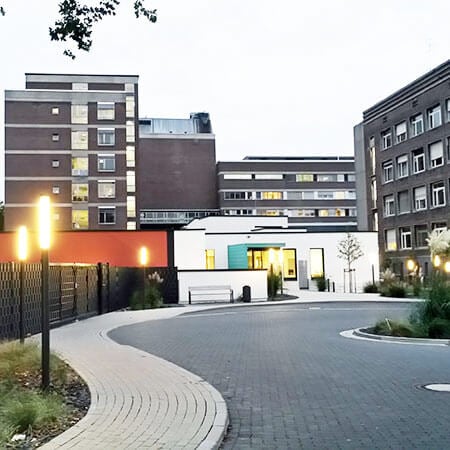Ulcerative colitis
Ulcerative colitis is the diffuse inflammatory process in the large intestine that doesn’t go beyond its mucous membrane. Colitis has the highest incidence in North America, Northern Europe and Australia. The pathology is peculiar with a high mortality level. One of the most harmful complications is large intestine cancer against the background of inflammation.
The Booking Health portal presents 82 German clinics specializing in ulcerative colitis treatment
Show all clinics
Ulcerative colitis – Diagnostics
Signs of the illness and also laboratory analyzes help to suspect the ulcerative colitis:
- Anemia, inflammatory markers, low level of the total protein in the blood
- Protein and blood (in severe cases) in the urine
- Red blood cells, leukocytes, intestinal epithelium in the feces
The following techniques are applied to confirm the diagnosis:
- Irrigoscopy, which is an X-ray examination of the intestine with the introduction of a contrasting agent.
- Colonoscopy is an endoscopic study, which implies the penetration of instruments and the optical system into the large intestine.
- Biopsy means taking a tissue sample during a colonoscopy and sending it for histological examination, which allows not only to confirm the diagnosis, but to establish the severity and duration of the inflammatory process, as well.
Best clinics for the ulcerative colitis diagnostics in Germany:
Ulcerative colitis – Treatment
Ulcerative colitis is treated conservatively. The first measure is a diet with the restriction of spicy food and dairy. If a patient suffers from the complex disease form, he might be recommended to keep a diet with minimum fiber content. This means that a patient has to give preference to the small amount of high-energy food.
Drug treatment includes 5-amino-salicylic acid medications, glucocorticoids, and cytostatics. If they don’t show any effect, then antagonists of tumor necrosis factor alpha are administered. Doctors provide treatment to detox patient’s organism and correct anemia; they also prescribe antibacterial treatment in case of exacerbations.
Surgery is indicated when:
- There are complications, like bleeding or perforation
- Megacolon in the case of ineffective conservative treatment within a day from the moment of hospital admission
- Intestinal obstruction
- Malignancy is suspected (cancer development on the background of ulcerative colitis)
- Epithelial dysplasia in several tissue samples obtained during biopsy
- Severe course of ulcerative colitis, which is not controlled by conservative methods of treatment
Pathologically changed parts of the large intestine are removed during the surgery. Volume and a type of surgery are determined by a specialist on the basis of the clinical case peculiarities, technical and human resources of the clinic.
Ulcerative colitis – Innovative treatment
The aim of the new treatment developments is to increase conservative therapy effectiveness, reduce the need in surgery, and mortality level.
Lately, new directions of ulcerative colitis treatment have appeared:
- Leukocytapheresis presupposes the purification of blood from activated T-cells and allows to achieve remission in 20-80% of cases. According to data obtained during a research in German hospitals, remission was achieved in 52% of patients, who did not respond to azathioprine medication treatment. Another research proved that the speed of remission onset depends on the procedure frequency. Thus, when leukocytapheresis was done once a week, remission was reached in 22 days on average. Performing leukocytapheresis three times a week anticipated remission in 7.5 days.
- As recent research has shown, interferon alfa pegylated use in a dose of 0.5 μg/kg allows obtaining remission in 60% of patients in case of daily injections for 12 days.
- Alicaforsen medicine was in Phase III of clinical trials in 2016. This desensitizing oligodeoxynucleotide inhibits the activity of leukocytes, which provoke the inflammatory process in the large intestine.
- Bacterial recolonization of the intestine is used to increase the duration of remission. Bacterial cultures, mainly E. coli Nissle and Lactobacillus acidophilus, are introduced into the human intestine orally or in the form of enemas. Facts prove the effectiveness of fecal bacteria therapy (the introduction of feces of a healthy person to a sick person using an enema). It is assumed that the mechanism of therapeutic influence is caused by competition arising between pathogenic and opportunistic bacteria.
- Helminthes therapy is a new direction still being explored. Leading developments are done in the USA. A person is infected with helminths, which are not able to reproduce in his body. According to one of the studies of the University of Iowa (USA), infection of a human with Trichuris suis eggs allows to achieve a stable remission in 70% of cases.
Dendritic cells for ulcerative colitis
Doctors in developed countries provide treatment of ulcerative colitis with dendritic cells. It allows for the normalization of immune processes, thereby reducing the frequency and severity of exacerbations. Dendritic cells (DCs) are antigen-presenting cells that "show" T cells targets to attack. They absorb the antigen, "disassemble" it into fragments, and, in this form, demonstrate it to other immune cells.
Treatment of ulcerative colitis with dendritic cells is used when standard therapies for ulcerative colitis cannot provide a good result. The vaccine for ulcerative colitis is prepared individually for each patient. During dendritic cell therapy, monocytes are selected from the patient's blood, matured into DCs, activated, and repeatedly injected into the body.
Best clinics for the ulcerative colitis treatment in Germany:


Ulcerative colitis – Rehabilitation
Rehabilitation is the process of body restoration from injuries, surgeries or diseases. It can have a different orientation such as: oncological, orthopedic, neurological, etc. There is also general therapeutic rehabilitation. It is indicated for patients after conservative and surgical treatment of the internal organs diseases.
The directions of the general therapeutic rehabilitation
There are several main directions of the therapeutic rehabilitation such as:
- Medical one, which includes the restoration of patient's health, normalization of body functions, stimulation of compensatory possibilities, elimination of the chronic pain, etc.
- Physical one, which is responsible for improving of work capacity and tolerance for physical activities. In the complex cases, the purpose of this therapeutic rehabilitation area may be the restoration of the self-service ability.
- Psychological one, which helps to eliminate the mental disorders which may occur as a result of a disease (phobias, depression, apathy), to increase the human motivation, and to adapt to the changed living conditions.
The World Health Organization underlines 3 phases of rehabilitation such as: hospital phase, a phase of recovery and supporting phase. Different tasks are solved in different phases. The hospital phase is conducted immediately after the treatment. After the first phase begins the second one which usually takes place in sanatoriums or rehabilitation centers. This is the boundary between two periods, namely illness and future life. Then a supporting phase is required. The patient maintains the achieved level of his health and physical activity at home or visits the rehabilitation center from time to time.
Therapeutic rehabilitation methods
The most modern rehabilitation programs are used in Germany. They are adapted individually for each patient, and are based on the recent disease, age, physical possibilities, and the results of treatment. Different specialists such as: therapists, psychologists, rehabilitators, kinesiotherapists, physiotherapists are involved in the rehabilitation process.
The following methods of rehabilitation are used:
- Dosed physical activity
- Training on the simulators and in the pool
- Physiotherapy
- Acupuncture
- Manual therapy
- Microcurrent therapy
- Compression therapy
- Lymphatic drainage
- Natural factors of the nature (mud, thermal waters, etc.)
Any rehabilitation may include medicamentous support. It is necessary to hold a consultation with the patient about the proper nutrition and the way of life which is important for him in the current situation.
Rehabilitation programs in Germany are designed for 2 weeks. If necessary, they can last much longer. In this country, the patient is provided with qualitative care, accommodation in comfortable rooms and individually selected meals.
Rehabilitation programs in Germany show one of the best results in the world. Most patients successfully restore their employability and excellent health there. They remain physically active, return to the full social and family life.
Best clinics for general therapeutic rehabilitation in Germany:
Author:
The article was edited by medical expert, board certified Dr. Nadezhda Ivanisova. For the treatment of the conditions referred to in the article you must consult a doctor; the information in the article is not intended for self-medication!
Sources:
The cost of services includes
Here you can find the cost of treatment for this disease at the German University Hospitals. Leave a request and we will provide a free consultation with a doctor and will start organizing the whole treatment process.
The program includes the following:
- Issuing of an invitation for getting a visa for treatment as quick as possible
- Fixing an appointment at a time convenient for you
- Preliminary organization of a comprehensive examination and discussion of the forthcoming treatment plan
- Arranging transfer from the airport to the hospital and back to the airport
- Provision of interpreting services and services of a personal medical coordinator
- If necessary, assistance in the organization of further surgical treatment
- Provision of a medical insurance against treatment complications covering up to 200,000 euro
- Preparation and translation of medical records and recommendations from the hospital
- Assistance in the subsequent communication with your attending physician, including consultations on repeated X-ray images through the unique medical document management system E-doc




